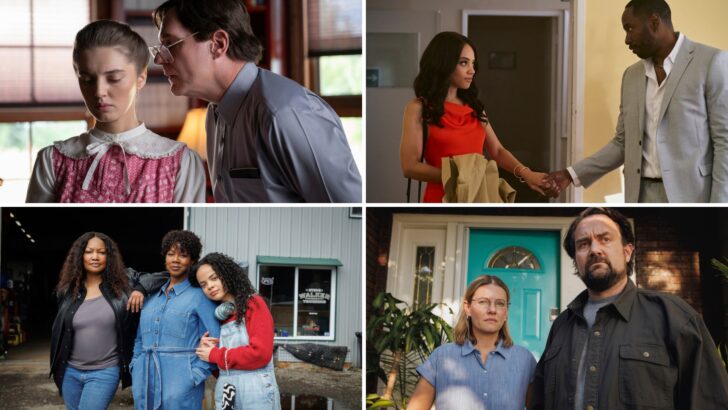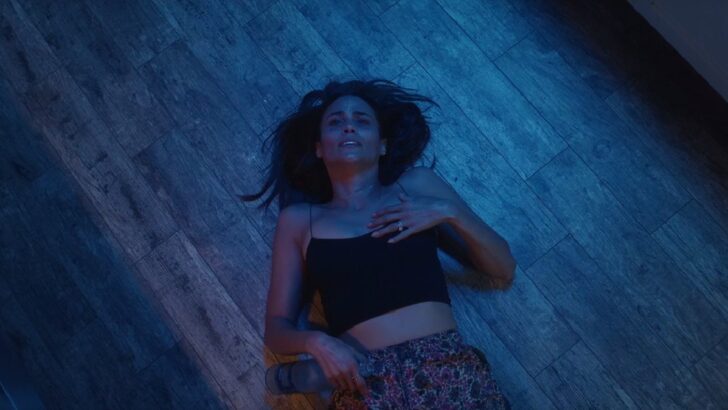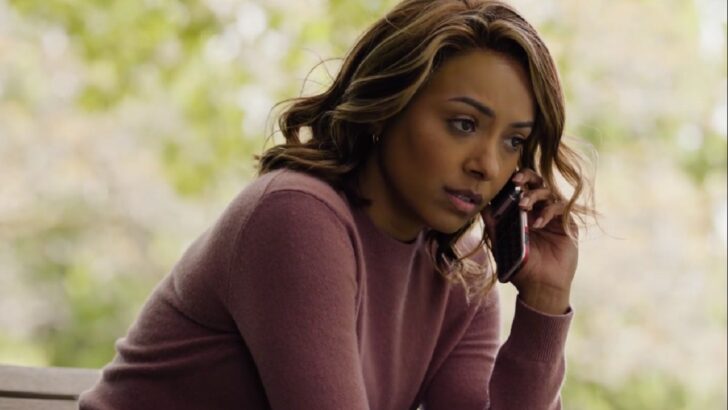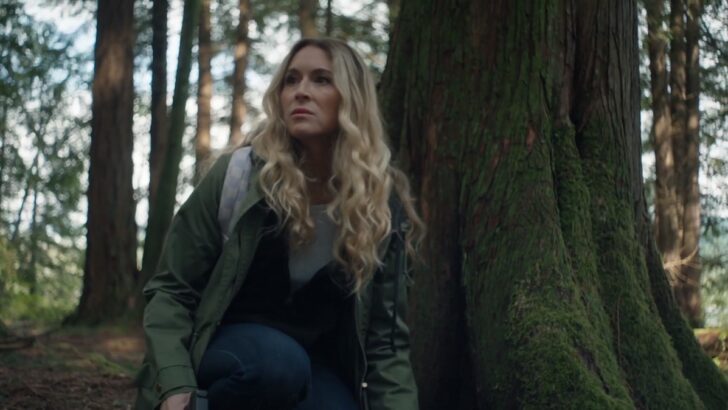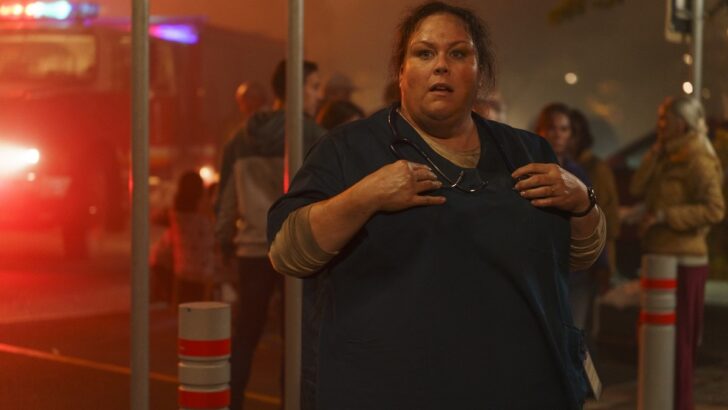Strength. Bravery. Resilience.
These are the words that come to mind when watching Surviving My Father: The Rachel Jeffs Story, an incredible, powerful, albeit challenging watch that explores the life of the brave daughter of the infamous Warren Jeffs, leader of the FLDS.
We had the pleasure of speaking with the incredibly talented and thoughtful Kaitlyn Bernard, who led the film, embodying Rachel Jeffs with the same quiet strength and poise as the woman she portrayed. Check it out!
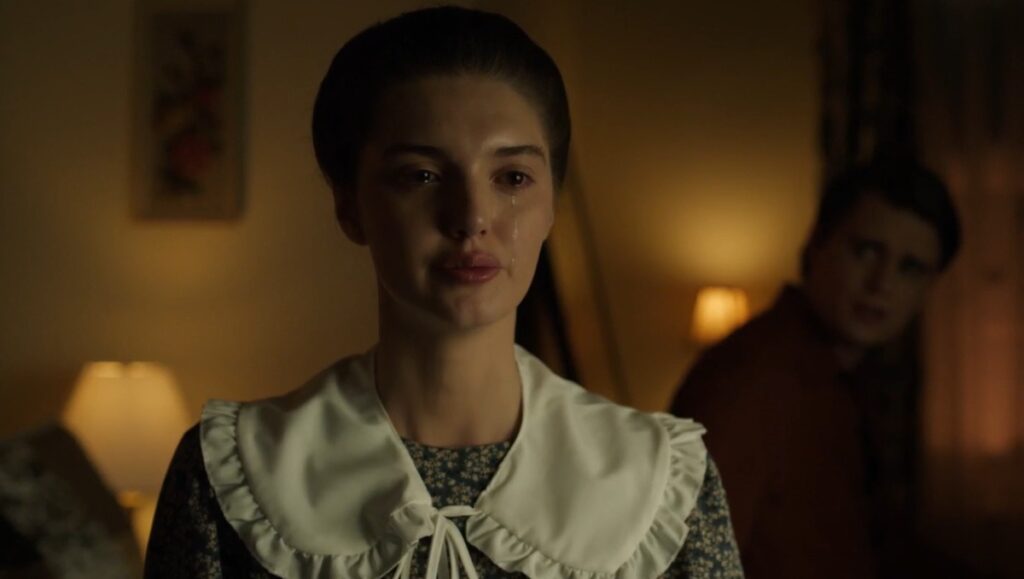
First of all, you were absolutely remarkable in this. It was such a difficult watch. I do want to give you your flowers for that, because it’s a challenging role to play, for sure.
How did you get involved with this project? What attracted you to this role?
I’ve always loved playing challenging and complex characters. And this is my first ever time playing someone, portraying a story that actually happened, and playing a real person.
And it was really intense because I wanted to do my best to honor her story, doing it in a way that was sensitive and really showcased her resilience, as this is a story about trauma, manipulation, and all that she endured, but it’s also a story about survival.
I really hope that comes through in the performance and throughout the story, because when I first heard of Rachel Jeffs’ story, I was completely floored.
When I got the audition, I did more research because I had heard of Warren Jeffs being on the FBI’s Most Wanted list. But then, when I did more research into Rachel’s story, I was just absolutely floored.
And just in researching all of the trauma and everything that she went through at such a young age, and then being able to come out on the other side and really rewrite her story was super inspiring.
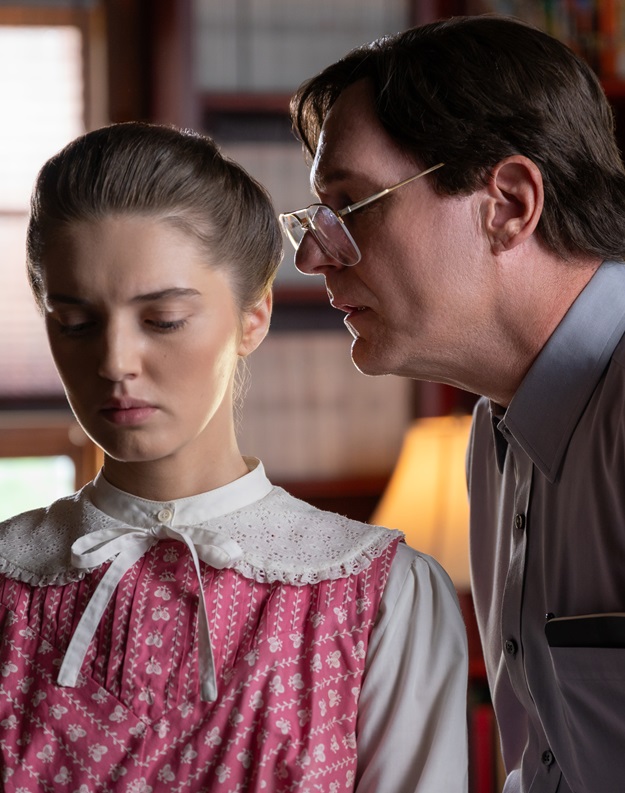
Did you get to work or speak with Rachel in any way to get a feel for how to get into character?
Prior to filming, actually the day before, our producer, Amelia, set up a call with Amelia, Ali, the director, and me. We had a Zoom call with Rachel, which was amazing.
She’s exactly how she is in her interview. She’s so sweet and a little quiet-spoken. And she just has this silent strength to her, even when she talks about her trauma and everything that she’s been through.
There’s so much strength underneath it. And that’s something that I definitely wanted to bring into the character. And I hope that’s represented in the film.
It definitely is. Strength and resilience were words that came to mind while watching. I thought the film did a great job of depicting that, where it wasn’t just about her being a victim, but being a survivor. And there’s such a distinction between the two.
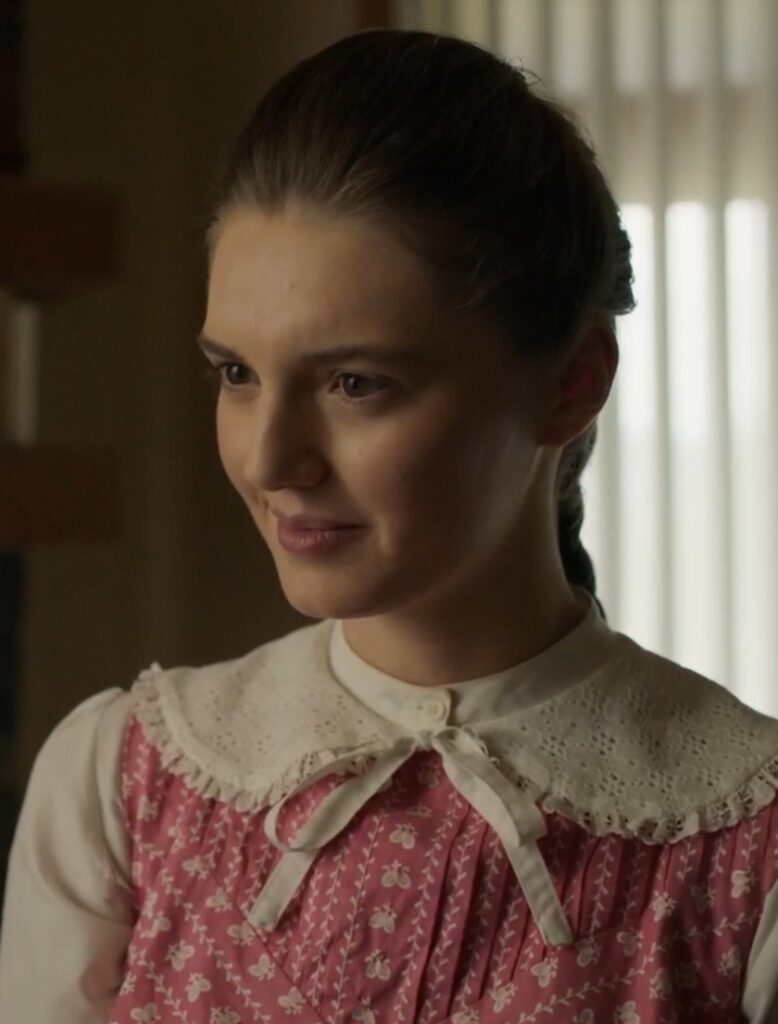
What parts of yourself do you think you brought to that role? What did you take away from it and apply to your own life?
I think definitely the resilience. Although Rachel’s story is super unique, there’s this underlying sense of being able to rewrite your own story, despite what has happened to you in the past.
I’ve definitely been through some hard times, especially within the last couple of years. Obviously, nowhere near to the extent that Rachel had gone through, but it’s just overcoming adversity and leaving all you know. That was definitely a part that I brought into the role.
It’s so difficult playing someone real, you know, versus an actual character.
Yeah, totally, because you want to do the story justice. When we spoke to Rachel, we asked her if there was something in particular that she wanted us to portray in the film. This is the day before production. And she said, “No, I know that you’re doing an amazing job. I’m just going to pray for you tomorrow.”
And that was so, so beautiful. And that just kind of depicts the kind of person that Rachel is. So we were all in tears at the end of the Zoom call. It was very intense emotionally for all of us.
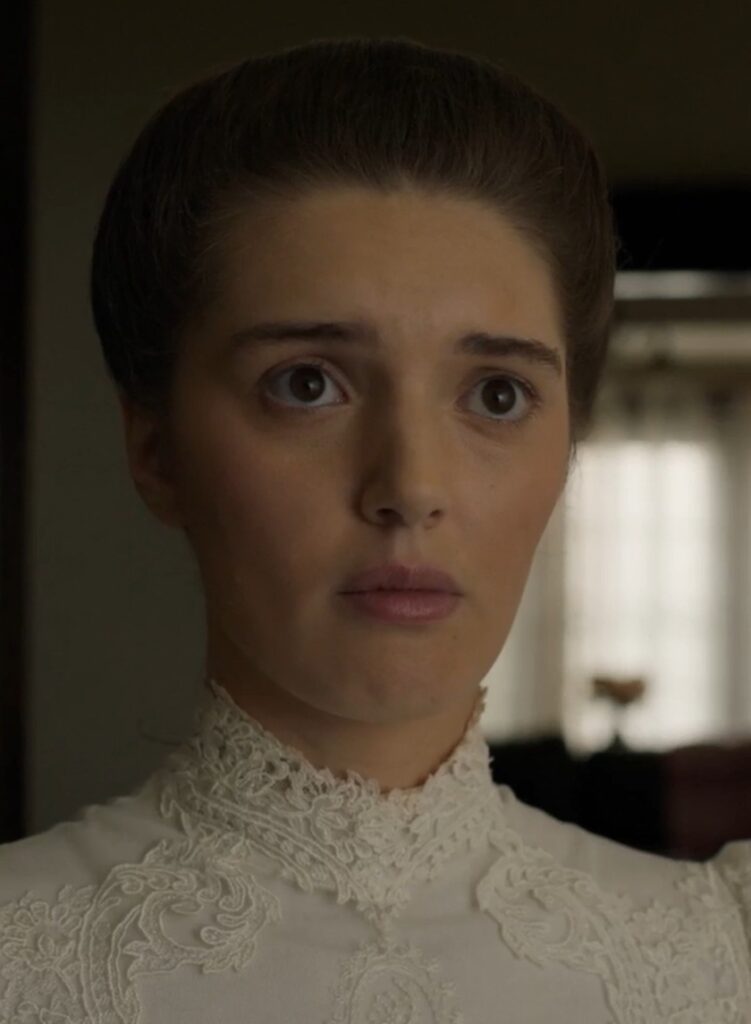
In this film, it’s almost about the weaponization of religion and faith. But then you have someone like Rachel, who, in most cases, you would assume she’d turn away from it. But she turns toward it more. Rachel never loses faith.
It’s a very inspiring story on that front. And I wanted to know what your thoughts were about that.
Totally, it is a really tough thing to balance. Someone close to me, whom I’ve recently connected with over the last year or so, came from a Hutterite community. And he left his community, leaving everything he knew behind.
He couldn’t go back to that community, and when I spoke with him, I realized that faith played a huge part in carrying him through that experience. Although I’m not an overly religious person myself, talking to him made me understand that faith was a significant factor in his journey.
And just listening to Rachel’s interviews and her views on faith, and she still struggles with it. She said a couple of times, where it’s like, because you were taught that this is what God is, and you’re doing all these things for God, and God is talking through the prophet.
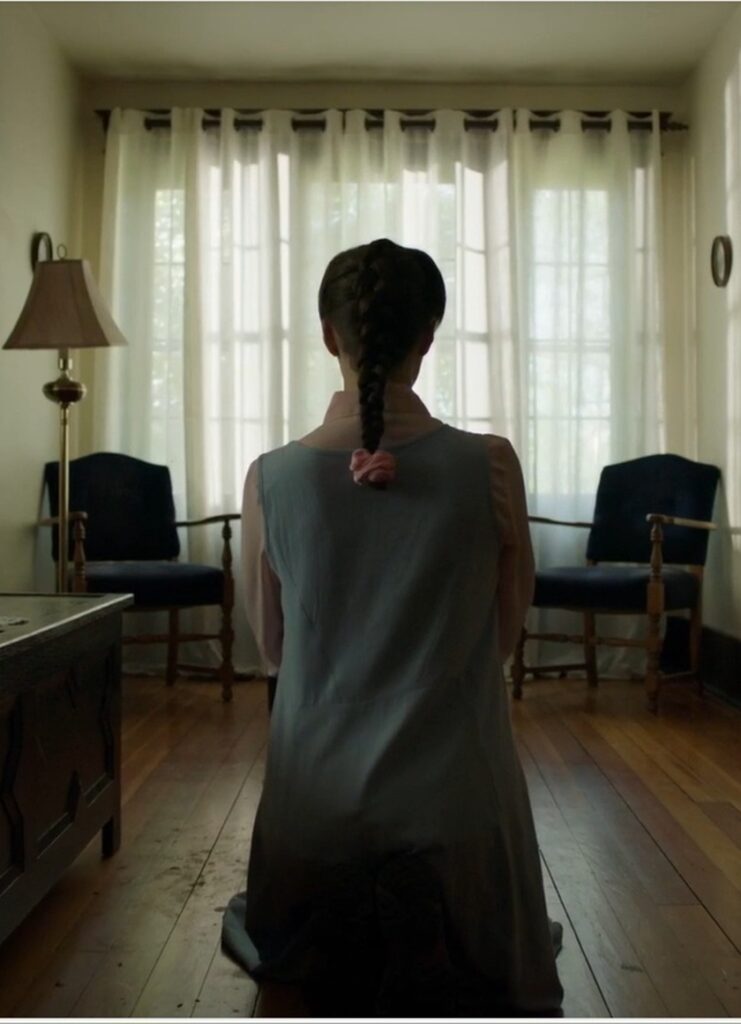
And I think it’s such a tricky balance, because you wonder, well, if God’s saying to do all these things, is he really good?
For Rachel, a lot of her faith came from within and through her children, because that’s the turning point when they threatened to take her children away again; that’s what flipped the switch. And she’s so determined to find a way out. And she does use prayer as a way to have that faith and to persevere.
It was definitely interesting having those conversations with my friend, who comes from a moderate community, and hearing his take on it. And then also listening to interviews with Rachel, because it’s not something that I can personally relate to on that level.
I also enjoyed that this film, which it’s Lifetime, so it’s always to be expected, but just how well it really centered the women in it. And two of the dynamics I really enjoyed the most were Rachel and her mother and her sister. They’re really great, complex, powerful sort of dynamics.
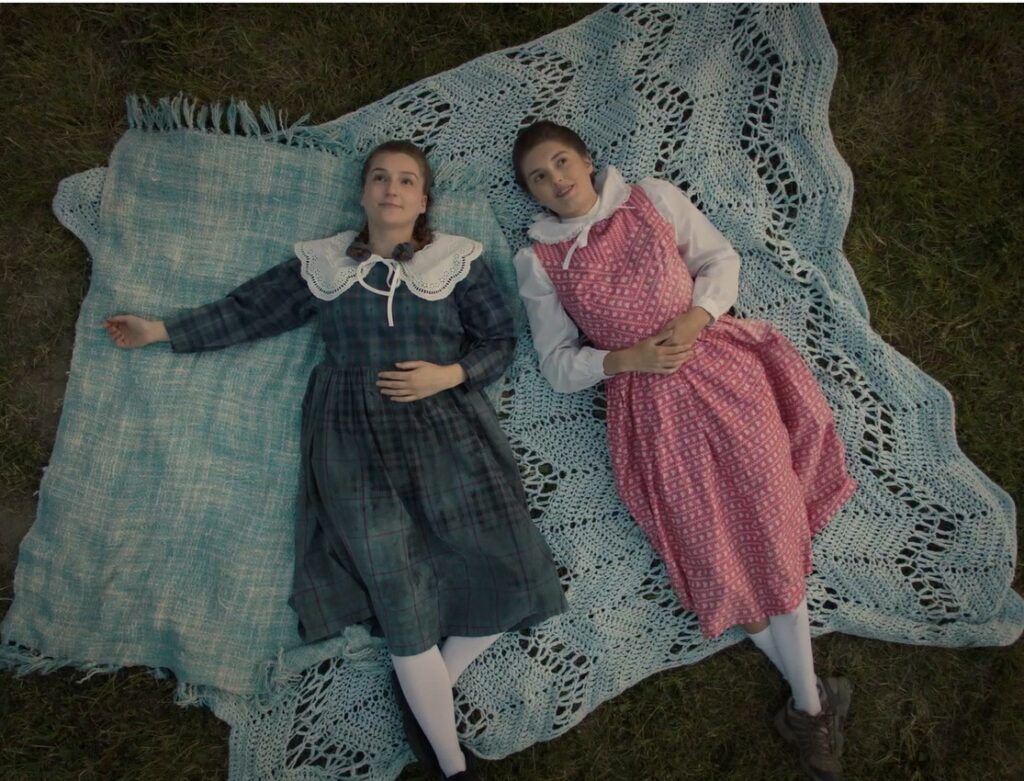
You guys had such great chemistry. Did that come naturally? Was that just a really nice, easy chemistry that you had? Or was that something you had to work at?
Britt [Robertson] brings so much warmth to the story. She was a joy to have on set. I think it was great to have that anchor while you’re doing these emotionally demanding scenes, and it’s super intense.
And even having a female director and a female producer being on that set added to that environment. And Elyse [Maloway], I can’t speak higher about her. She’s amazing.
We clicked instantly, and we were like besties from the get-go. So she was just one of those people that I felt that kind of instant connection with. And we still keep in touch.
She’s incredible. So, yeah, it was really easy to have those kinds of connections, which is always great, because you never know what you’re going to get when you get on a film set, where you’re working with a bunch of different personalities. And both of those women were incredible to work with.
And then there’s Michael [Eklund], who, even though he was super terrifying, so terrifying on screen offspring, he was just like the kindest, kindest person in the world. So I’m super grateful that I had that experience where he was easy to talk to, and he wasn’t fully in character the entire time.
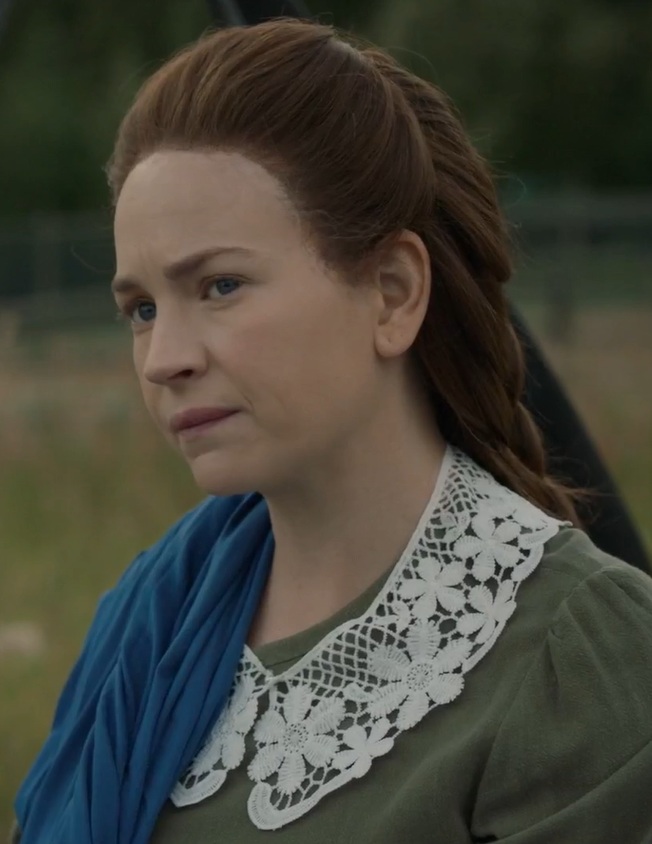
I wanted to ask about that. How do you guys decompress after filming such heavy and emotionally intense scenes? Is it difficult transitioning?
Yeah, every actor has their own process. When I’m in the middle of shooting a scene, especially if it’s very emotionally intense, I like to sit on my own, have my AirPods in, or just be reading my book and still kind of stay in that, I guess, in the scene. Versus some actors can just like, “Oh, let’s go to crafty. Let’s go do this.”
I like very much to just kind of stay in, and then after the scenes are done, Michael and I are cracking jokes and playing cards or whatever it is. We played a lot of card games on that set.
Where did you guys film?
In Kelowna, British Columbia. I’ve shot three or four things in Kelowna. I absolutely love shooting there. It was a real treat to work in Kelowna.
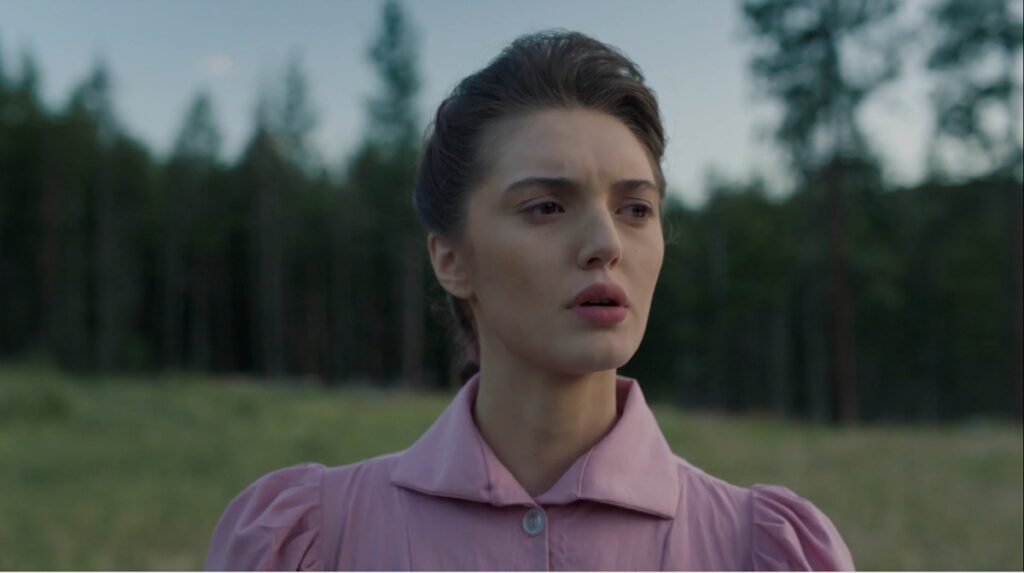
Initially, with Rachel and her husband, it felt like an unorthodox love story, given the situation, and he was a safe space until he became more susceptible to her father and things like that. Can you talk about that?
Yeah, that’s one of the biggest turning points in the movie when she confides in her husband, and then they go and talk to Warren. The entire film, Rachel doesn’t feel like she ever has a safe space, unless it’s her sister, because even her mother, when she tried talking to her, didn’t go well, either.
But even her sister’s still influenced by Warren, and everyone’s too afraid to speak up.
So I think it’s devastating when she thinks she’s found someone she can finally confide in and tell all these things to, and the relief she feels when that happens is only kind of blocked by Warren once again. That’s one of the most heartbreaking scenes in the film.
It comes down to having those connections. She really is just searching for someone that she can connect with. She obviously gets that at the end of the movie. But yeah, it is a really heartbreaking story.
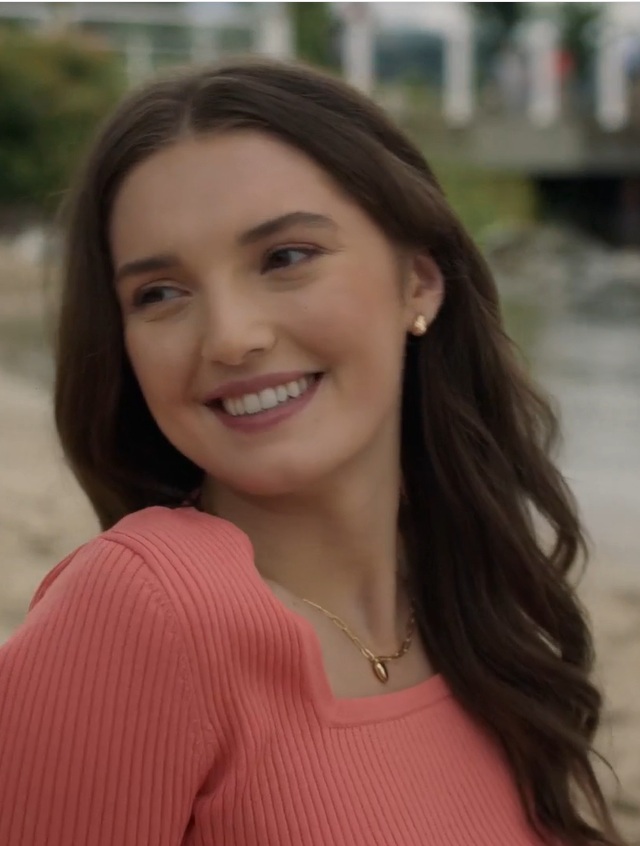
It is. But also a very powerful one. Why do you want people to watch this film? What do you hope they’ll take away from it when they do?
Like I said, Rachel’s story is very unique. However, there are universal themes, such as manipulation, trauma, perseverance, and resilience.
I hope that people who see this movie see there’s a light that’s shed on these hidden worlds of polygamous sex, but also that you see this woman who’s redefining her own future, who’s rewriting her story, despite what happened to her.
It’s a really inspiring movie. And I hope people can see that, despite everything she’s faced, she’s come out the other side of it.
You can stream Surviving My Father: The Rachel Jeffs Story on Lifetime.
Interviews like this with Kaitlyn Bernard take time and care — and we hope it shows.
If you liked hearing from us, please comment or share the article. Show Kaitlyn Bernard some love below. That’s how we keep conversations like this going.
-
Cults, Justice, Resilience: Lifetime’s Ripped from the Headlines Slate Is Must-See
Lifetime is making our October worthwhile with its Ripped From the Headlines slate that features four must-see films on resilience
-
Finding Faith Review: Same Sermon, Same Song — A Retreaded Path of Predictability
Finding Faith concludes Lifetime’s faith-based slate, and despite a strong cast, it was more of the same. Our review!
-
Terri Blackstock’s If I Run Review: Kat Graham & Evan Roderick Leave Us Hooked and Hanging
Lifetime lures us in with Kat Graham and Evan Roderick in Terri Blackstock’s If I Run, then leaves us hanging. Our review!
-
Before Your Father Finds Us Review: Faith, Fury, and Maternal Instincts — Alexa PenaVega Goes Full Warrior!
Before Your Father Finds Us continues Lifetime’s faith based slate with a thrilling tale that pits Alexa PenaVega against Tahmoh Penikett. Our review!
-
Faith in the Flames: The Nichole Jolly Story Review: Embers, Endurance, and Rising From the Ashes
Faith and resilience collide as Chrissy Metz leads Lifetime’s powerful, inspiring Faith in the Flames: The Nichole Jolly Story. Our review!
TV Fanatic is searching for passionate contributors to share their voices across various article types. Think you have what it takes to be a TV Fanatic? Click here for more information and next steps
The post Kaitlyn Bernard on Capturing Strength, Resilience, and Sensitivity in Surviving My Father: The Rachel Jeffs Story appeared first on TV Fanatic.

